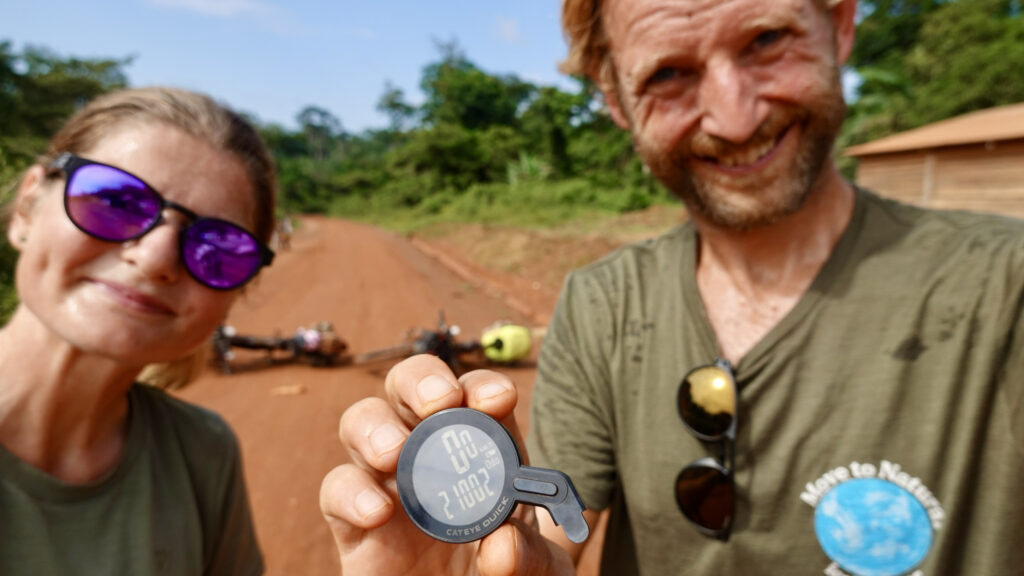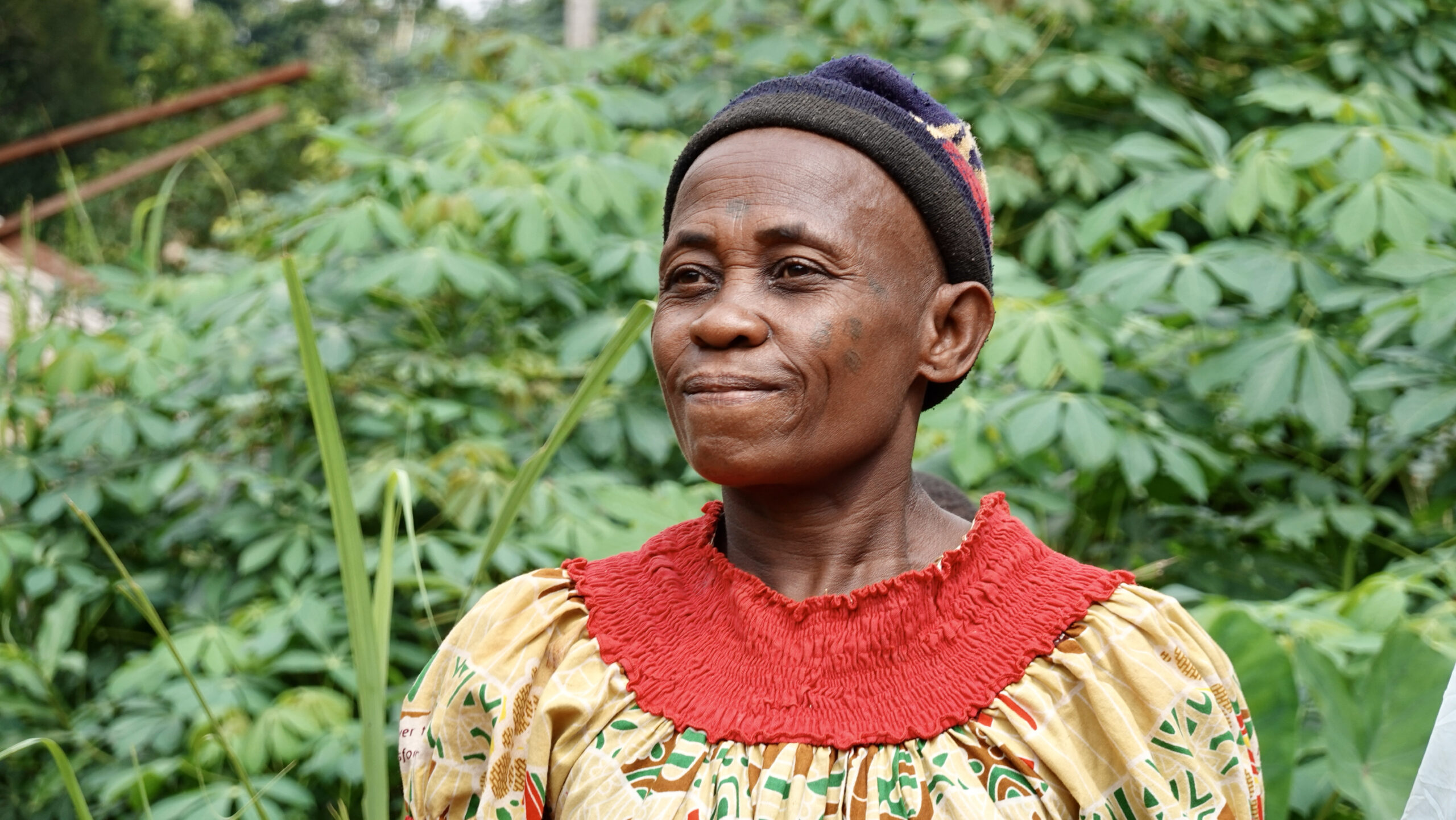In Cameroon we leave West Africa and cycle into a new region, Central Africa. Here we cycle far to the east, into the jungle, to meet the Baka, one of the world's last indigenous hunter-gatherers. Deep in the world's second largest rainforest, we meet a people who live in, by and with nature, but whose living conditions are disappearing as the forest is felled. Fortunately, we also meet people who do everything they can to help them.
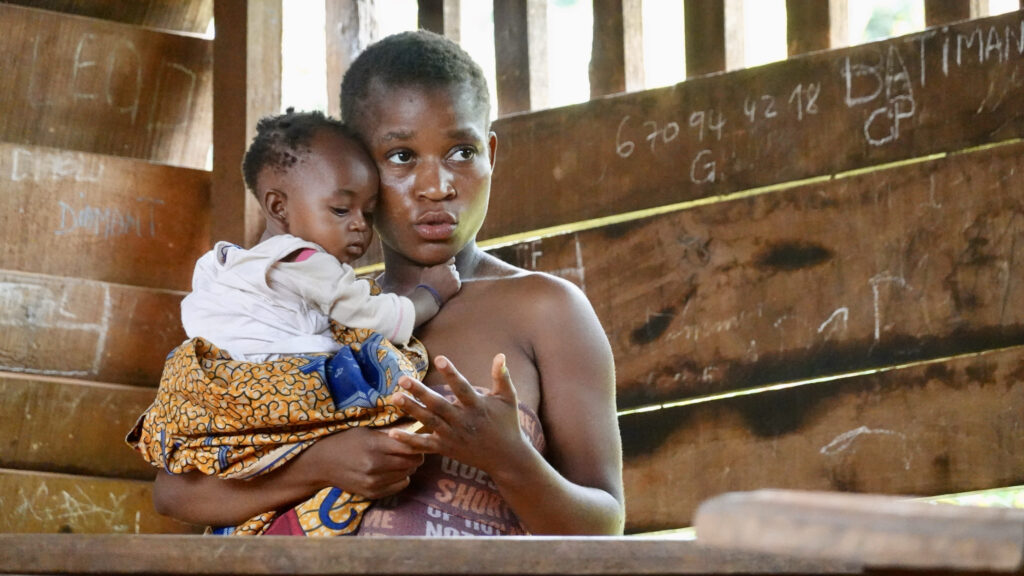
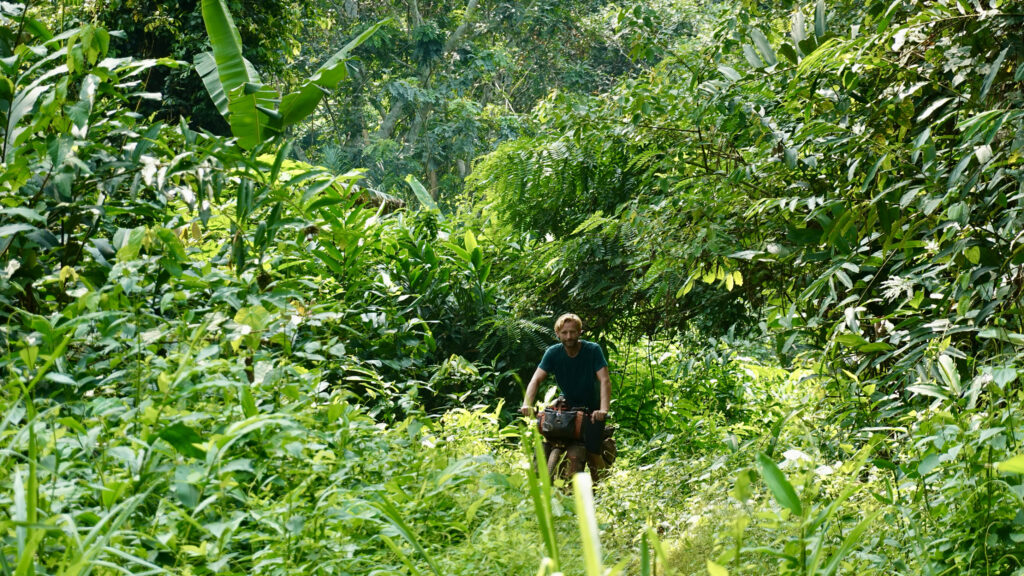
Colours, moisture and endless forest
The tropical rainforest of the Congo Basin is the world's second largest rainforest after the Amazon. We cycle on a dirt road that winds through the forest and which only opens up when a small village is reached. A place that is so different from what we know. The sounds of animals and birds playing on the forest floor and in the treetops. The monkeys that jump from branch to branch and that send signals to their friends when they spot us on the bikes. The damp forest smell settles in our nostrils and mixes with a sweet smell of fermented cassava root, which we are served at every meal. The T-shirt is constantly soaked and clammy from the heat and humidity, and it is impossible to dry our clothes.
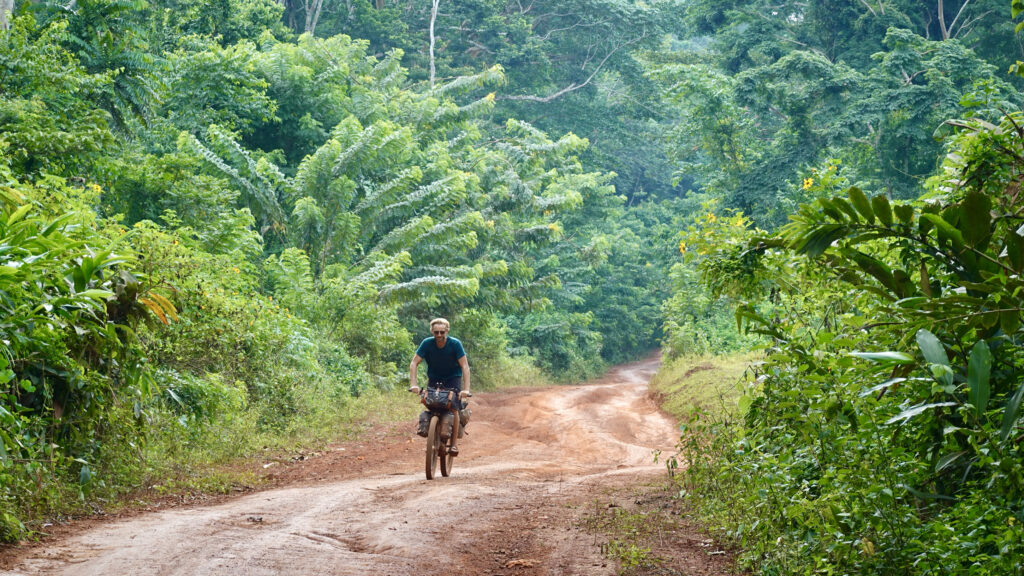
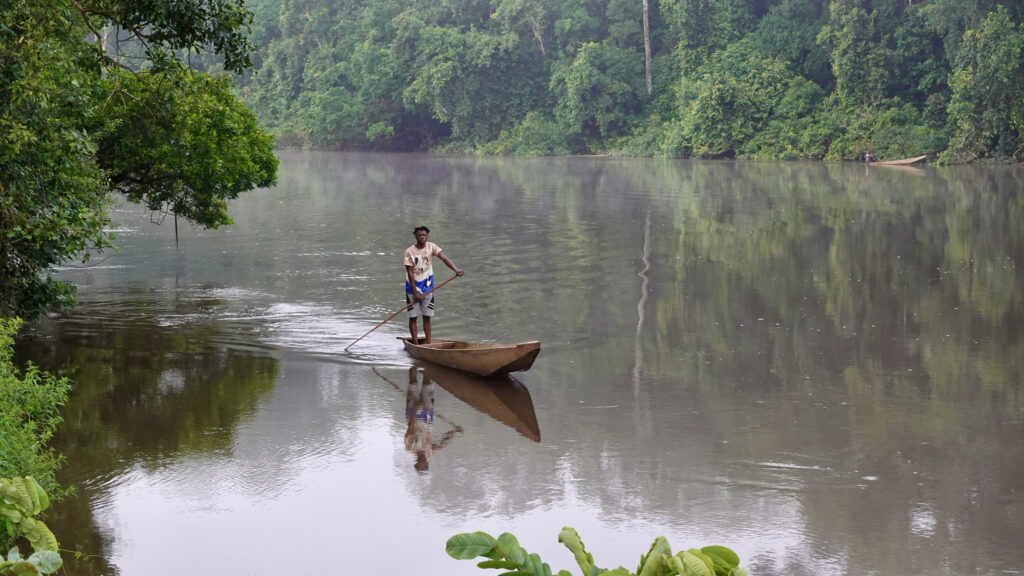
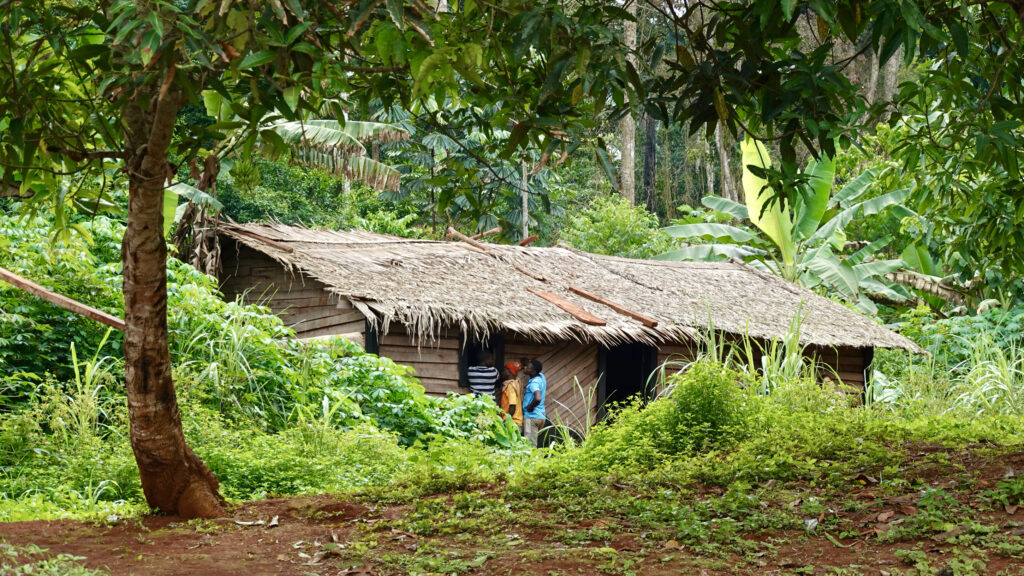
When it rains, the road turns to mud, and the bikes and clothes are colored completely orange in a split second by the clayey soil. The view is green with trees, creepers, hanging plants and even more trees of all shapes and sizes. The high humidity and temperature create ideal growing conditions for trees and plants, but also for fungus and rot, which hang heavy in the air.
It seems that there is some order in the chaos of how the plants grow and the lianas cling to the trees to survive. Or they all struggle to get into the light, which gives the very tall characteristic trees. The diversity is enormous. We see with our own eyes how the rainforest is the most species-rich area on earth. Both in terms of plants and animals.
We do not see the horizon, but into a thick wall of shades of green on either side of the road. The rainforest seems endless, even though we know that deforestation and destructive mining are raging beyond. There are so many details and layers in the jungle and yet it looks the same to our untrained eye. Behind the green wall there is a treasure trove of all kinds of animals, crops, berries and medicinal plants, which are home to the baka, which we cycle out to meet.
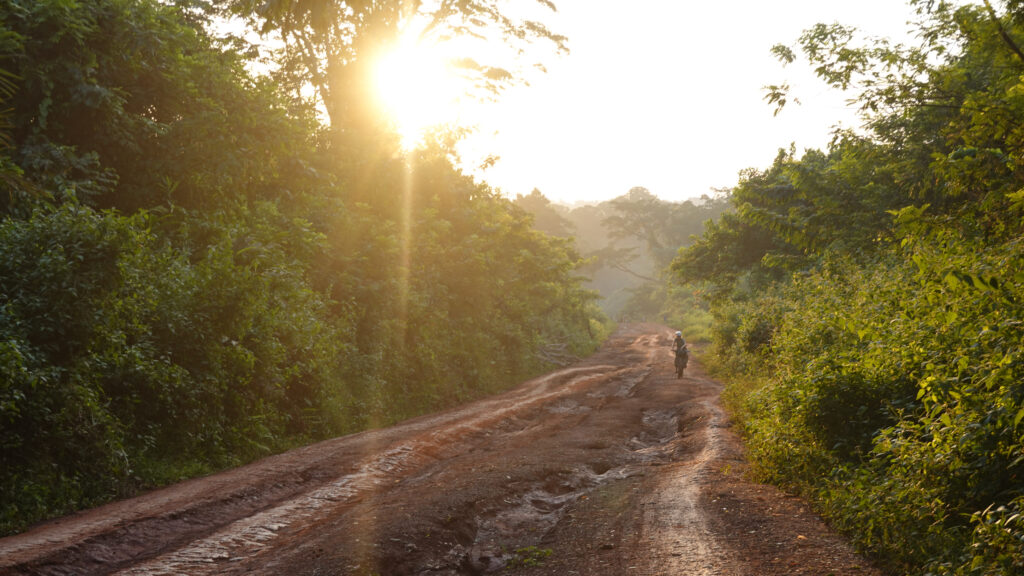
The Baka - a hunter-gatherer people
The Baka people are one of the world's last indigenous peoples. They are a hunter-gatherer people and anthropologists estimate that their culture has existed for more than 40,000 years. In the past, the collective term Pygmies was used, but the Baka prefer to be called by the name of the people.
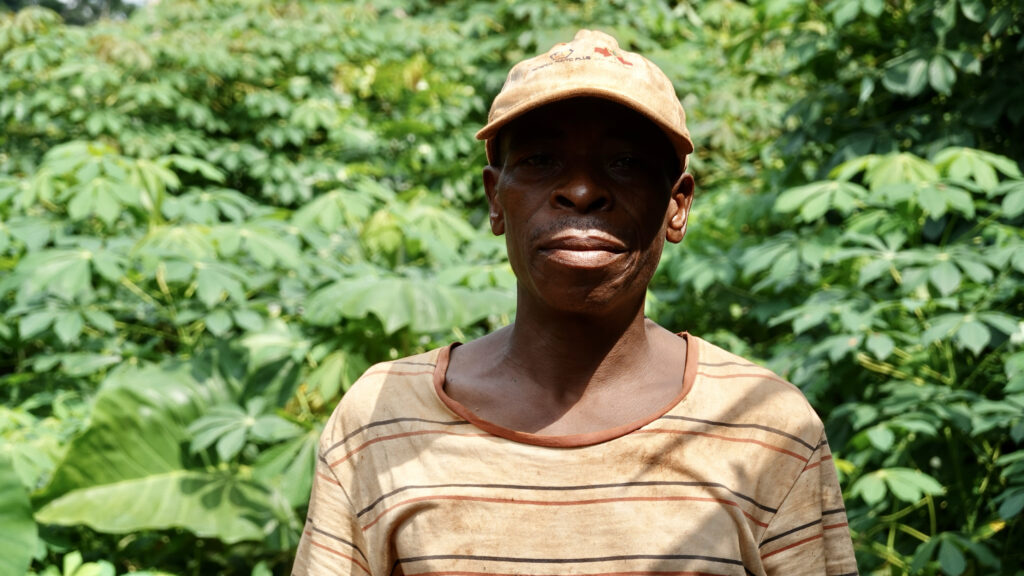
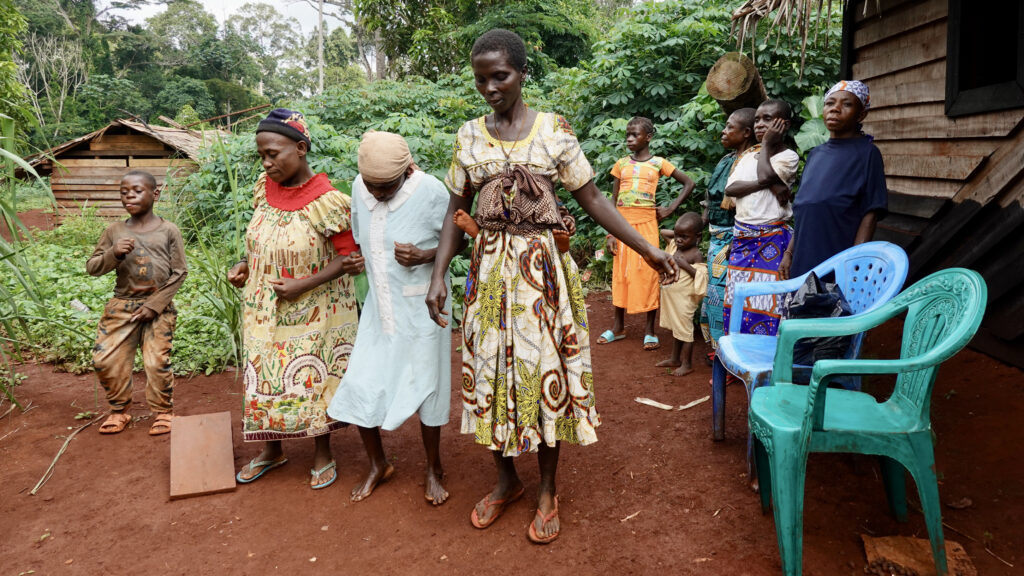
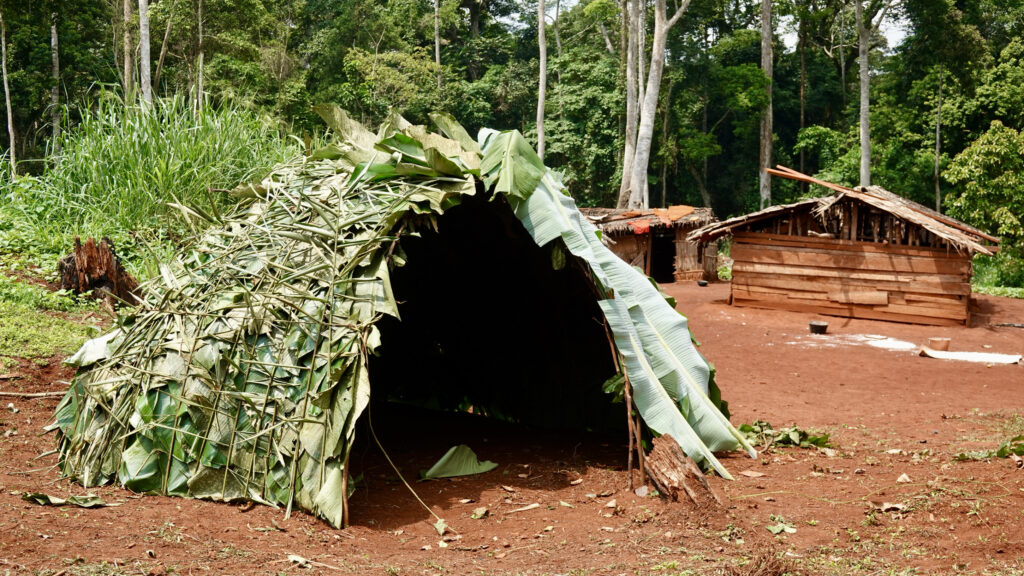
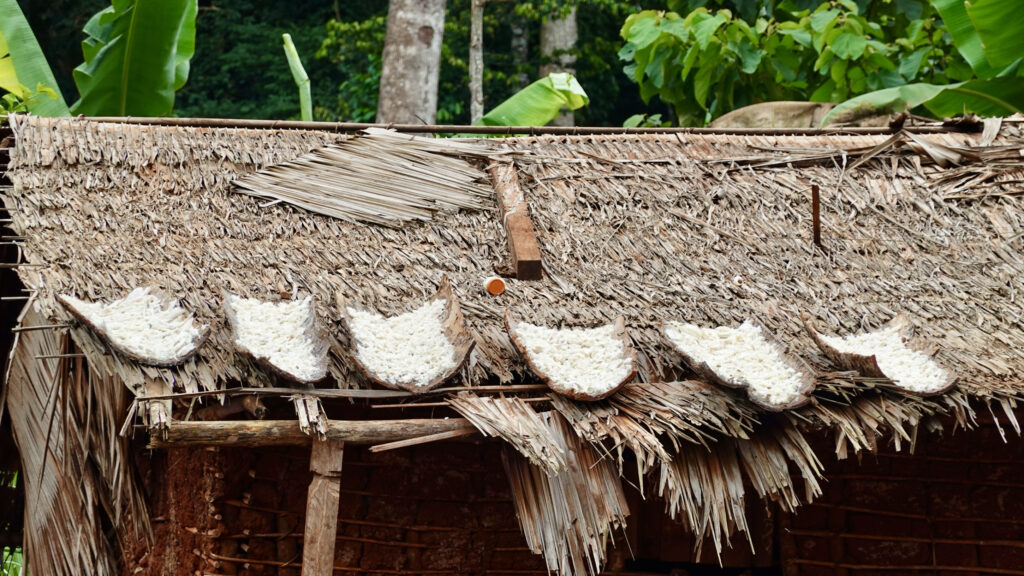
The Baka people live in symbiosis with nature, hunting and harvesting what they need for today's survival, but no more. The men can hear where the animals are and move towards. The women gather berries, leaves, roots, honey and plants. The forest is their storeroom and medicine cabinet, and other tribes come to them for healing. They live semi-nomadically, and they build huts of palm leaves for shelter at night. The forest is their home. Their lives are so closely connected with the forest that other tribes believe that the Baka can transform into animals through various rituals.
But all that has changed. The Baka people have been displaced, oppressed and pushed into the shadows of the modern world. It started in the 60s, but became really evident in the 90s, when deforestation and the creation of animal reserves were boosted. Activities that ensure economic progress for the few, but at the expense of the livelihood of an entire population group.
WWF spearheaded the creation of the reserves to protect the animals in the massive deforestation process. In return, they forbade the Baka to enter the reserves. In their home, in which they have always moved freely. There are cruel stories of how WWF guards have beaten and mistreated the baka, while rich foreigners have paid large sums for trophy hunting in the reserves. Whereas the indigenous people no longer have to hunt to survive. With fewer and fewer areas to move in and fewer opportunities to feed themselves, the Baka are relegated to small villages on the side of the road, against their nature.
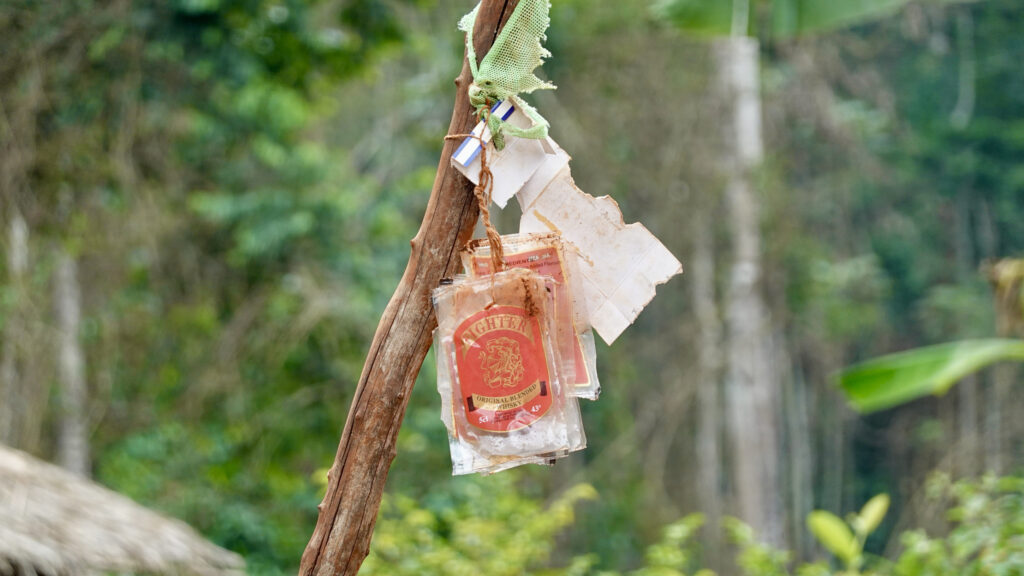
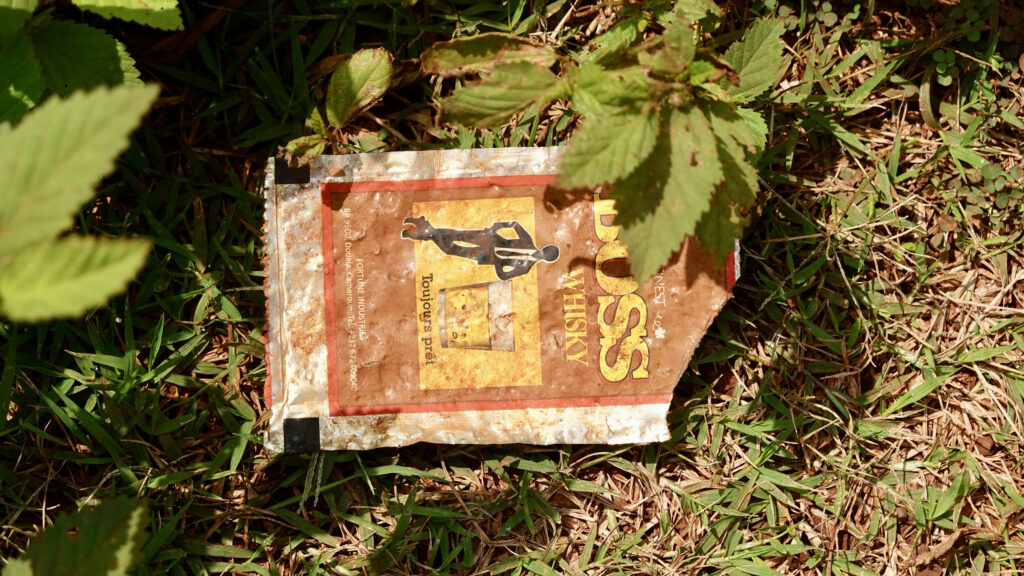
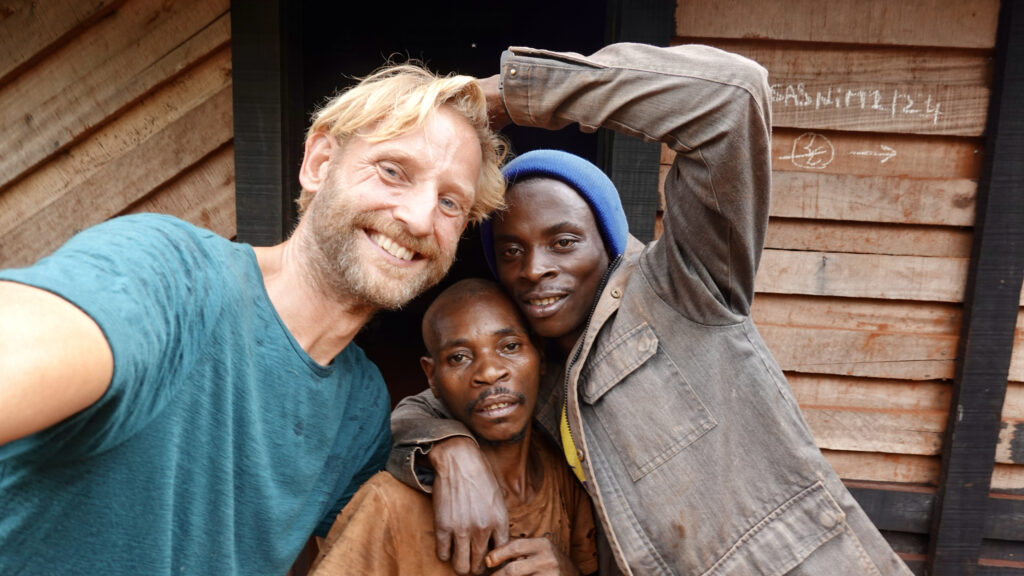
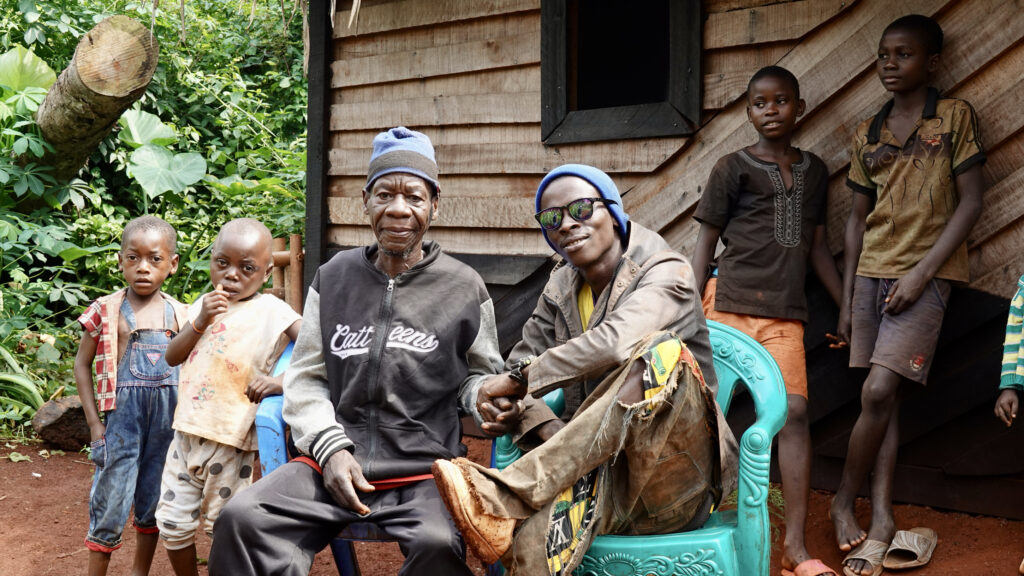
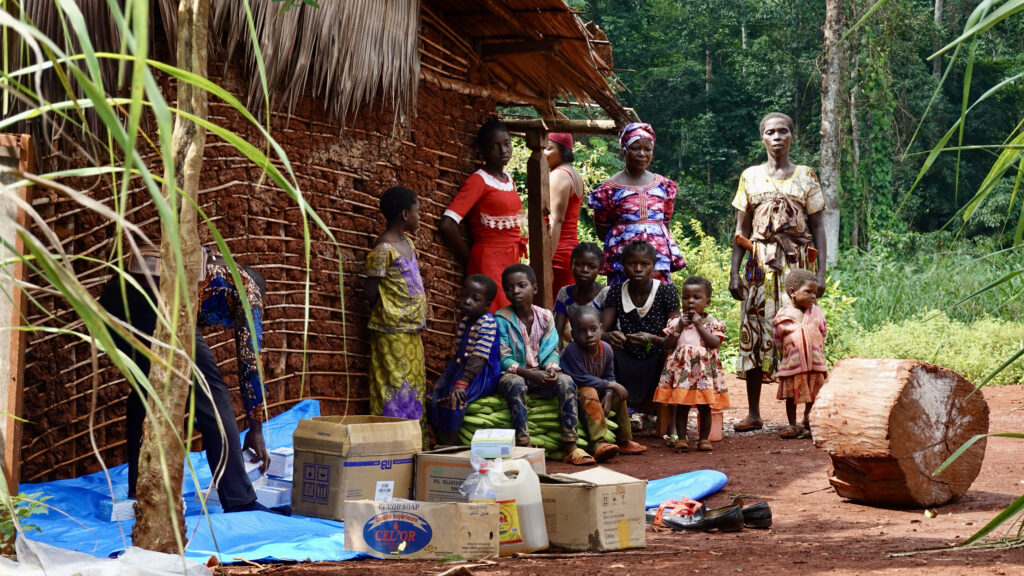
In many places we see small empty alcohol bags thrown on the road. Cheap booze that can be bought for 50 øre in a small bag. From early morning and throughout the day, we meet people whose eyes flutter and the smell of alcohol cannot be hidden. People seem resigned and the villages dysfunctional. The Baka people do not have the tools to cope in the modern world, which they themselves have not chosen to become a part of. It is not their natural instinct or how they were raised. They are exploited time and time again by cocoa farmers and others as cheap labour. In the worst cases only paid with alcohol. They are used by strawmen to shoot animals illegally, and if they are caught, it is the baka who end up in prison. The stories are many and depressing for a people who are the greatest role model for living in harmony with nature. With foreign interests that only focus on extracting raw materials as cheaply as possible, a government that only thinks of its own gain and WWF that only has an interest in nature and animals, the Baka people stand alone and are the big losers.
Fortunately, there are NGOs and locals who are fighting for dignity and respect for one of the world's last indigenous peoples. Some of them, we are lucky enough to meet in Cameroon.
The meeting with Charles Jones
We visit Charles and his family in the town, Bertoua. Charles is a fantastic, warm-hearted, bubbly, clever man whose life's work is to fight for the Baka and their living conditions. He is also a realist and recognizes that the Baka cannot continue with their original way of life. The goal for Charles is to help the Baka hold on to their rights, roots and traditions while at the same time being integrated into society.
Charles's wife is a strong smiling woman who has a huge kitchen garden close to the house and another in the jungle where they get most of their produce from. We are spoiled with delicious home-cooked food, and Marie learns some tricks. We enjoy spending time with family, where we immediately feel at home. Charles passionately draws us a map as he talks about his work with the Baka. He explains where we can meet the Bakers and gives us several contacts who can help us along the way. Among other things. to his good friend Dieudonné, who is waiting for us in Yokaduma.
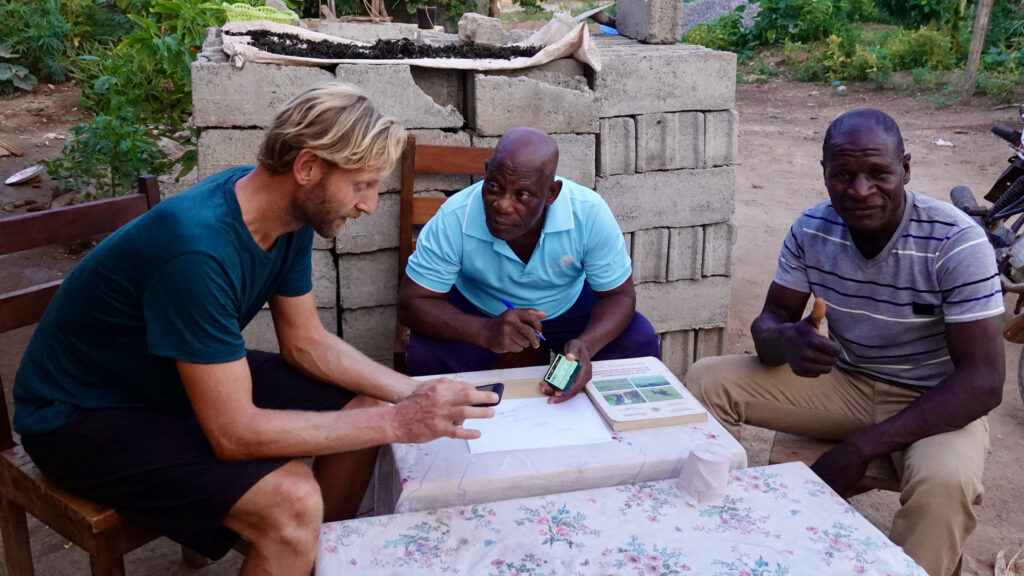
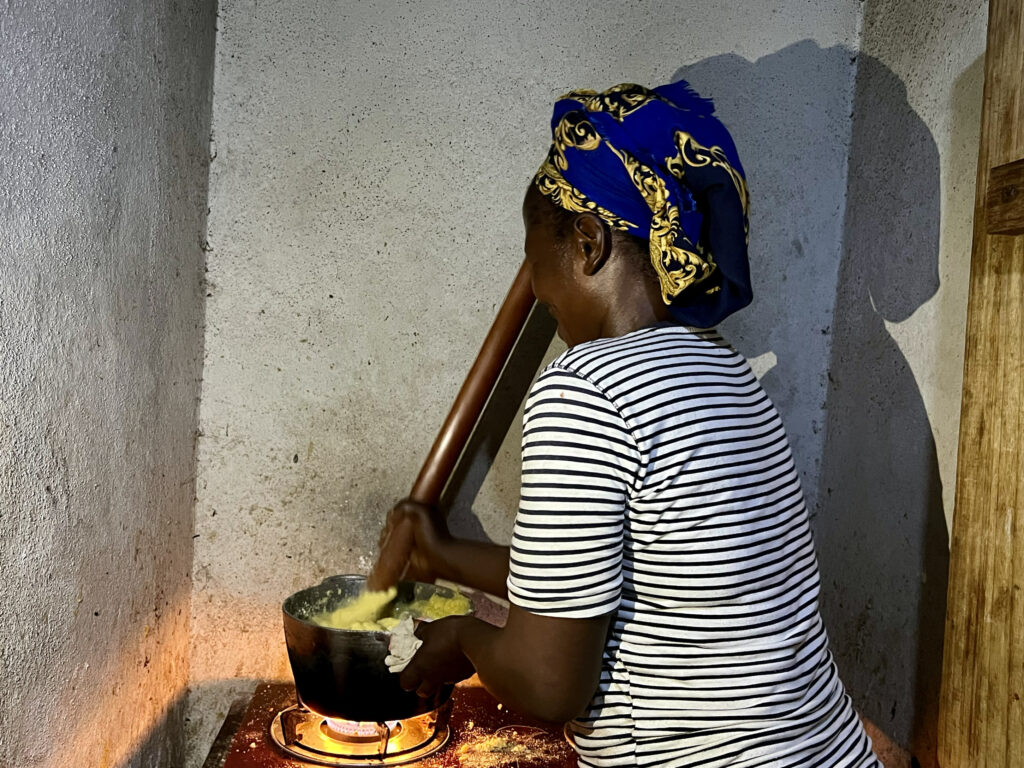
Elisabeth is a fantastic cook. Part of the food is cooked inside on gas and the meat outside over a fire. Then the taste will be better.
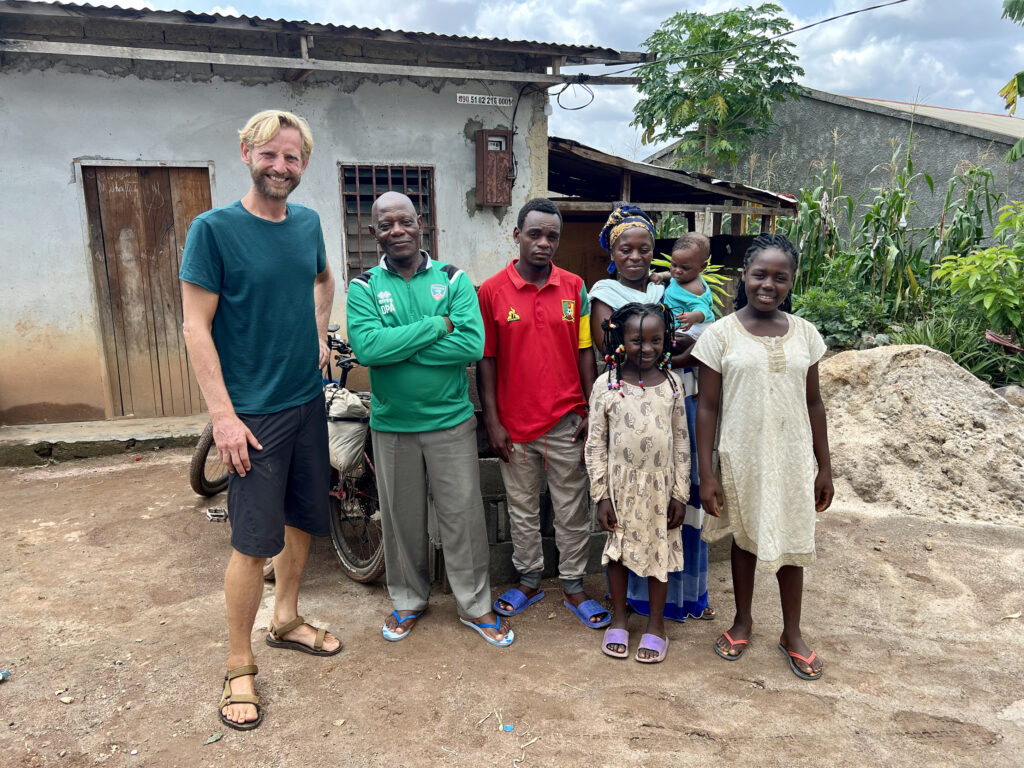
Dieudonné and the nuns
When we cycle into the town, Yokaduma, a man on a motorcycle overtakes us, while the man says 'You are welcome' with a huge smile. A moment passes before we discover that it is Dieudonné that Charles has put us in touch with. We cycle after Dieudonné through the city and to a Catholic mission, where we are welcomed by Nonne Julienne. It is a Catholic mission established in the 70s. A huge place with a church, several associated buildings and a nice garden. Today, three nuns and the priest of the church live in an adjoining building. We will be accommodated in one of the rooms belonging to the mission. A fine turquoise room with attached bathroom – and much-needed shower.
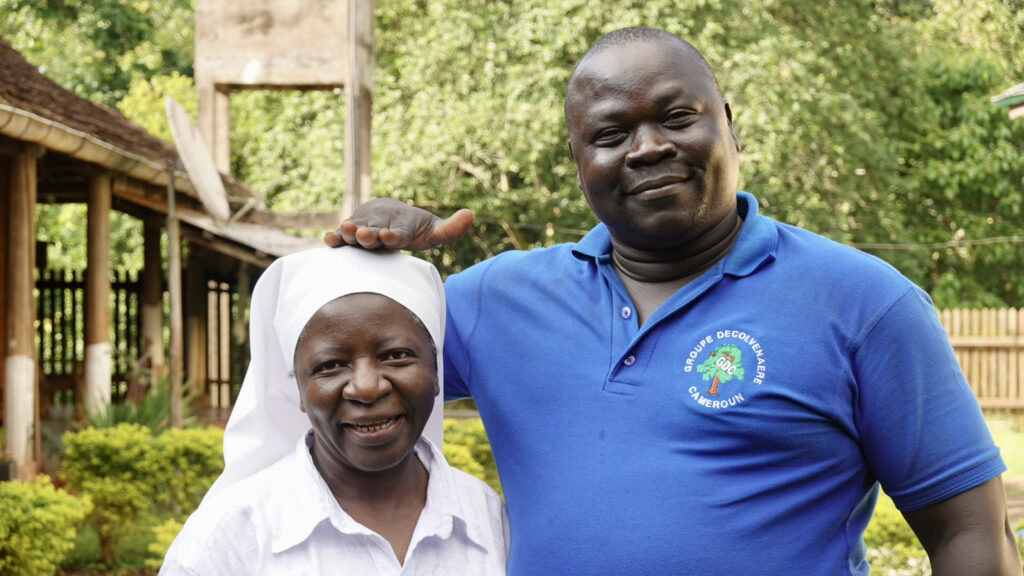
We spend the rest of the evening with Dieudonné. He is an enterprising man with a big heart and we immediately became good friends. He runs an organization with Julienne, in memory of Rita Rossi. An Italian woman who came to Cameroon as a Catholic missionary and devoted her life to helping the Baka. She lived in Cameroon from 1974 until her death in 2016. When Dieudonné moved to the city, he developed a close relationship with Rita Rossi, and therefore he wants to carry on her mission of a better life for the Baka. He takes us to a school that the organization has built. At the school, children and young people from Baka families receive an education, and they live at the school in the meantime. One of the Baka who attended the school has just been trained as a teacher and is now teaching in one of the Baka communities. This is exactly what Dieudonné dreams of. How the school can help give back to the baka communities.
Visiting the Baka people
With the same organization, we go the next day to a small village with Dieudonné, nun Julienne, a laboratory assistant, a lawyer and a translator to a small Baka village. The car is packed with medical equipment and medicine to be used to treat illnesses. Once a month they visit a village where they provide information and treatment.
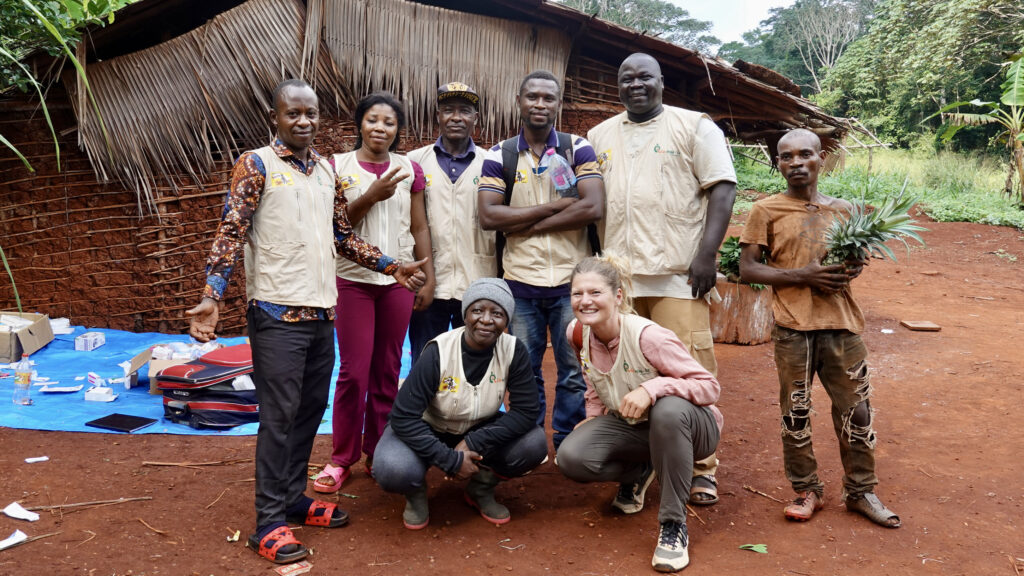
We arrive at the small village where there is a collection of houses on both sides of the road. There are few traditional Baka palm huts and otherwise wooden houses. The village teacher comes to us and shows us the school. An open house with a roof over. As we start setting up, the driver drives further into the jungle to pick up more baka that live further into the forest. We greet the village chief and people gather around us curiously to see what is going on. The population is a mixture of Baka and Bantu, which is a general term for ethnic groups in Central Africa. There are often disputes between the Baka and the Bantu, but here they live together.
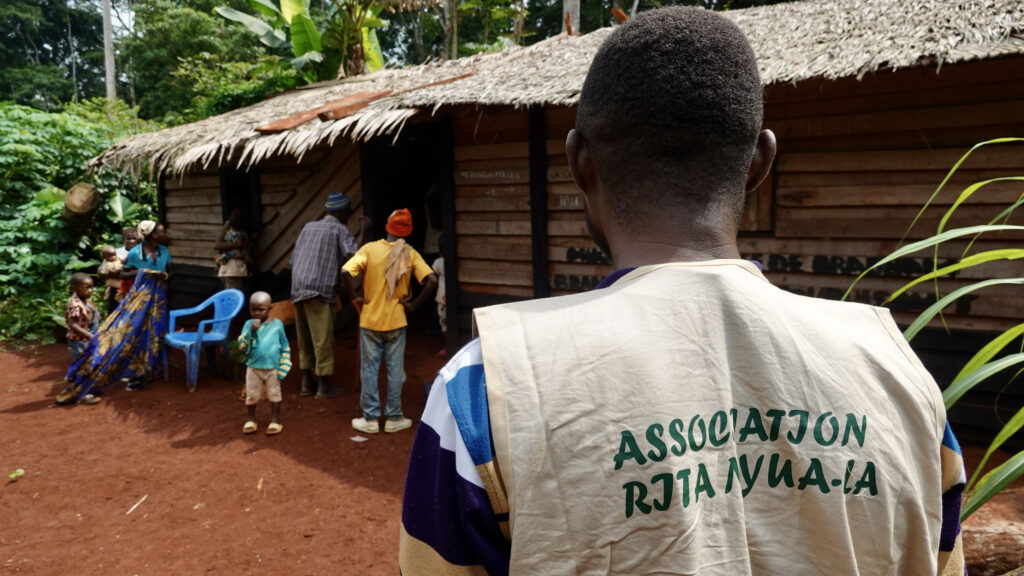
In one of the houses, a projector is set up and music is played. Beautiful local music blasts out of the speaker. People enjoy themselves and start dancing. Marie and Kenneth are lifted into a dance, and the atmosphere is good. The driver comes back with the car and the load full of people. We all gather in the common house, where people are pressed together and almost sit in layers, so that everyone can be there.
Dieudonné starts by telling about why they are here and continues with various information. The most important information is that alcohol and drugs do more harm than good and that there are consequences if they engage in violence, shoot animals illegally or commit other crimes. Dieudonné is in charge of the prison in Yokadouma, so he knows as much as anyone how important it is to explain to the baka what a prison is and that it is not a place they want to go. It makes an impression on us that the Baka people live so isolated from the rest of society that not everyone necessarily knows about a prison and education as we do. And we remind ourselves that we are deep in the jungle and far from the city. We don't see many telephones, radios or other contact with the outside world. Dieudonné has a video in which a young man who is in prison is interviewed. There are examples of baka who are in prison for violence, illegal hunting of animals, self-defense or because they have been used by others. The lawyer who is with them gives them advice and guidance and explains that they can get help from him if they need it.
A large part of the organisation's work is also making birth certificates. Without a birth certificate, a person cannot get an identity card and without it, they cannot access the school system or other rights in society. Many baka live for that reason completely outside or parallel to the rest of society.
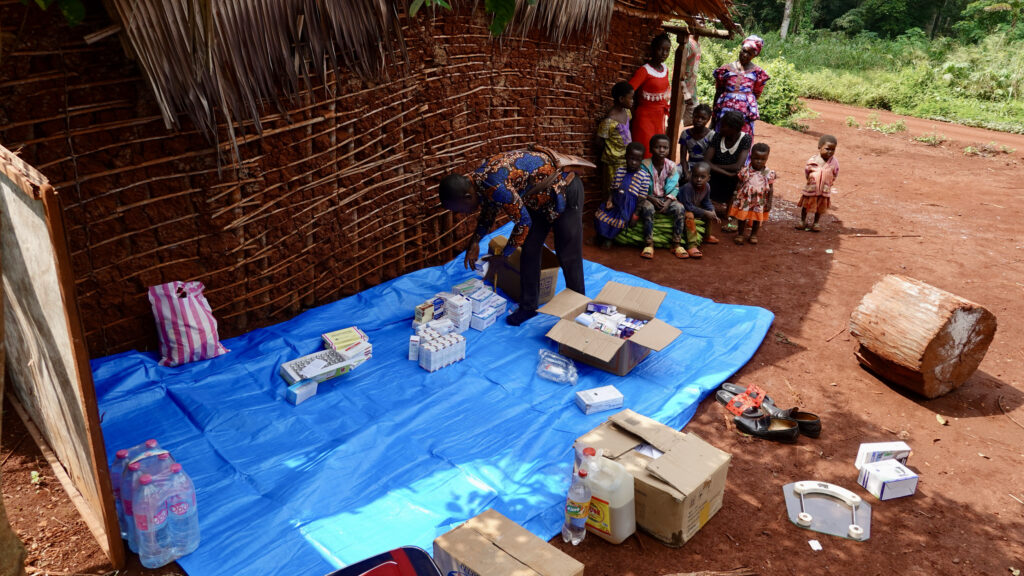
After this, preparations are made for a mobile medical centre. The lawyer and Marie start by registering the sick and measuring their blood pressure, weight and temperature. Marie is responsible for the weighing and widens her eyes as several of the women weigh around 40kg. and some down to 32kg. It's not much but common as they are small and slim by nature. They are then sent to the nurse, Nonne Julienne, who assesses what needs to happen. The next step is seeing a doctor, who Dieudonné represents. They take blood samples, which the laboratory examines, and then they receive a treatment. An efficient set-up that works. Today there are 48 people receiving treatment.
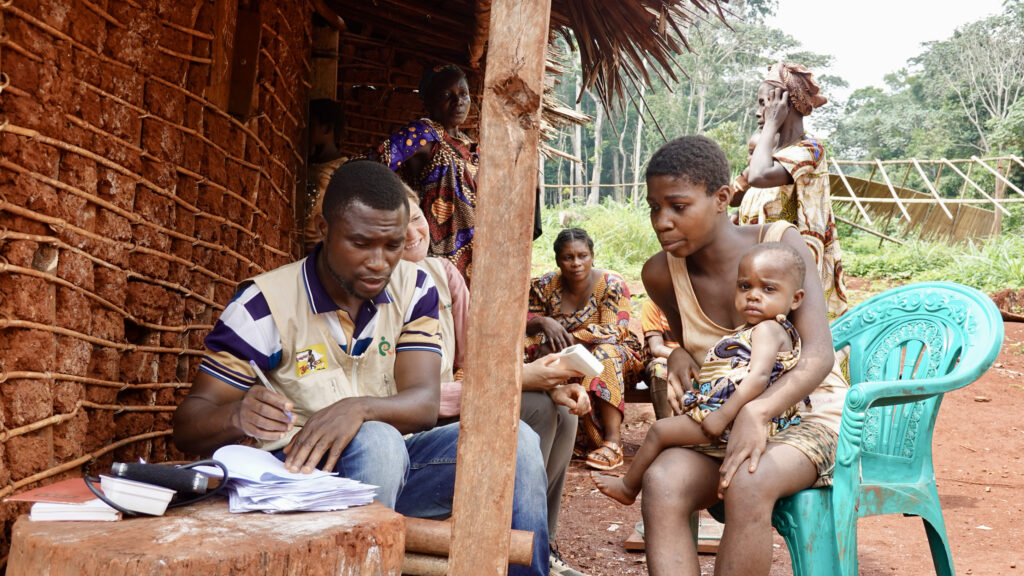
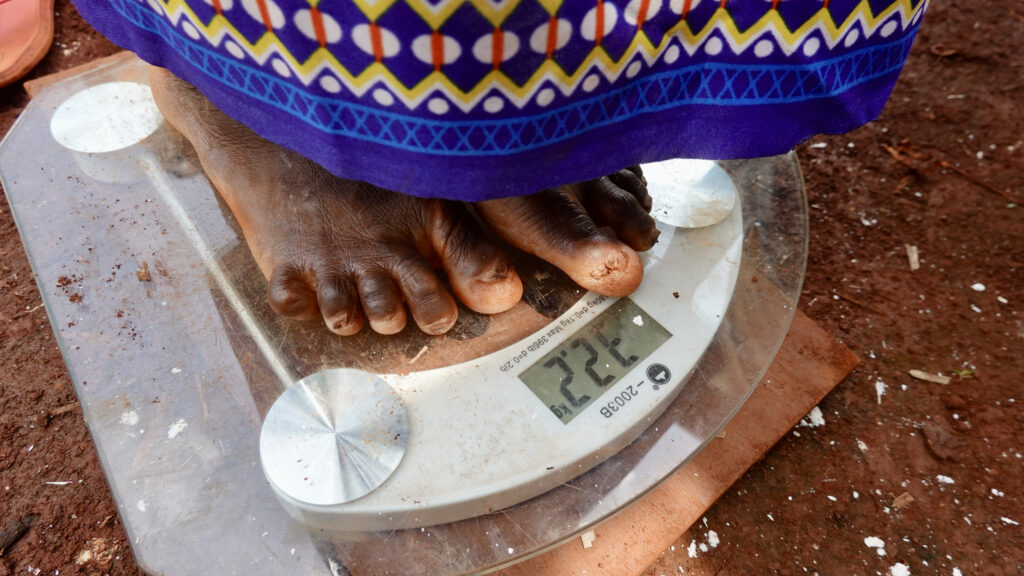
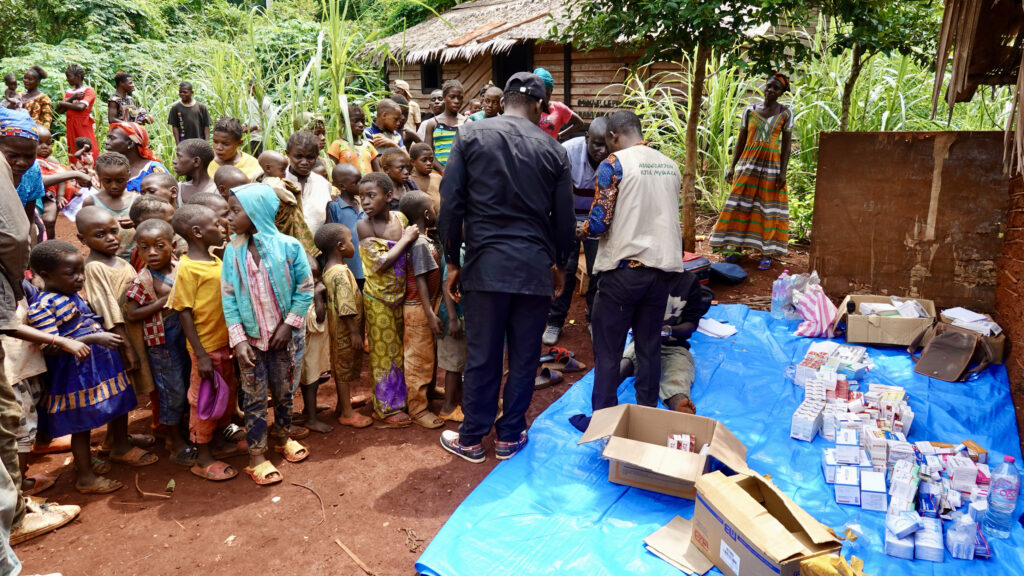
First, it is women with small children who report for checks, then women without children, the men, the young women and finally the young men. It takes almost the whole day, and two young guys show up to fight about something. A man and a woman smoke each other's butts. Some of the men have been drinking, and a few of them ask Kenneth for money, which they don't get. It is a motley group of people who are on the one hand so strong and on the other so vulnerable.
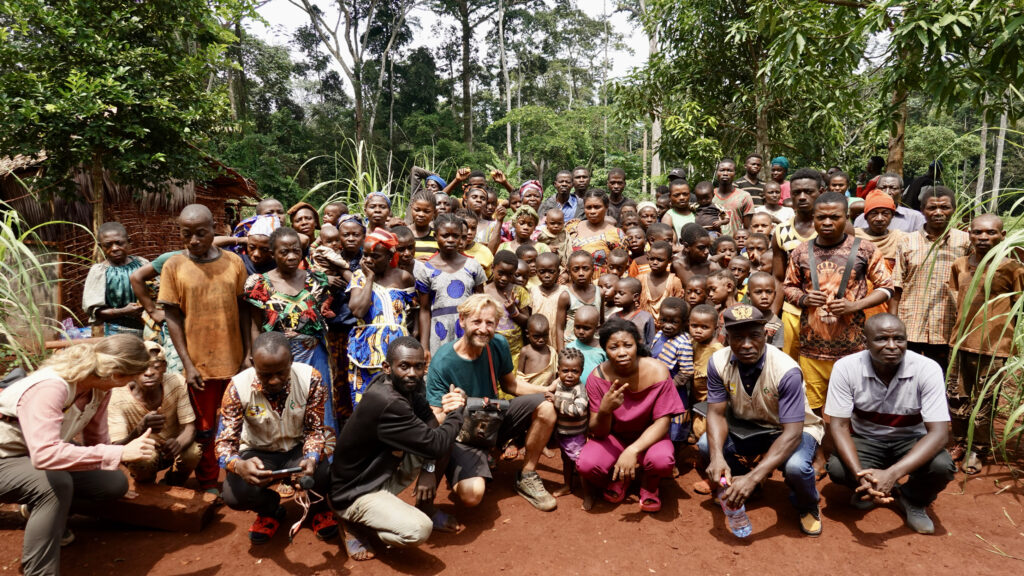
Bakers' living conditions
We stay a few days in Yokadouma to hang out with Dieudonné. We are invited home to his sweet family. He has five sons, the youngest only a few weeks old. His sister is visiting with her children to help look after the house and children. It is tradition for the family to send a member to help the new parents.
As darkness falls, Dieudonné drives Nonne Julienne and us back to the monastery on his motorcycle. Four men tall on a motorcycle through the city in the fresh evening air; The person responsible for the town's prison, a nun and two Danish cyclists. Something of a sight and such good friendships start.
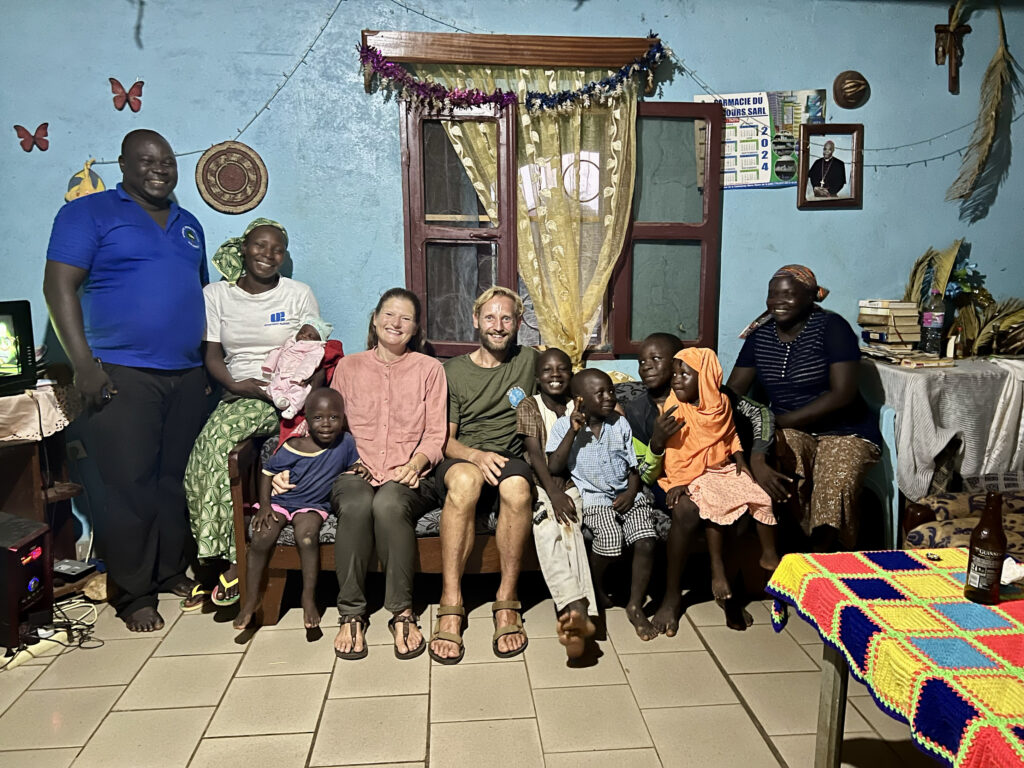
Dieudonné shows us the prison where he works. The first thing he shows us is the cutest little baby chimpanzee they have rescued. It was completely glued to its dead mother's body. The baby chimpanzee runs to Dieudonné, who gives it a swing ride, which it likes. After this, it catches sight of Kenneth, and it seems to be love at first sight from both sides. Kenneth picks up the little guy and it snuggles up to him.
We continue into Dieudonné's office. Here we meet a young Baka man who is incarcerated with his mother. The guy walks on crutches and has a bad leg. Dieudonné helps him with treatment. The young man's mother is imprisoned for having killed her husband with a club blow to the head. We didn't fully understand the young man's role in the fight, but he was deployed with his mother.
There is also a sack of rice in the office, which Dieudonné gives some to the inmates. The prisoners only eat once a day, and the state does not give them enough money to feed them. So the prisoners depend on their families to bring them extra food. The baka's families do not, as they live in the forest far away and do not have the opportunity to do so. That's why Dieudonné helps them as best he can. He also helps them if they need to go to the hospital or they need to be assisted in court. He speaks and understands part of the Baka language and can help translate. In addition, Dieudonné says that there were four inmates for violating the law for ritual acts. That is that they have either dug up a corpse to use bones for ritual acts or harmed people to take some of their body parts.
While we are sitting in the office, the little chimpanzee cub comes back and jumps onto Kenneth's lap. So they are smart, dear chimpanzees. It was just getting on the bike.
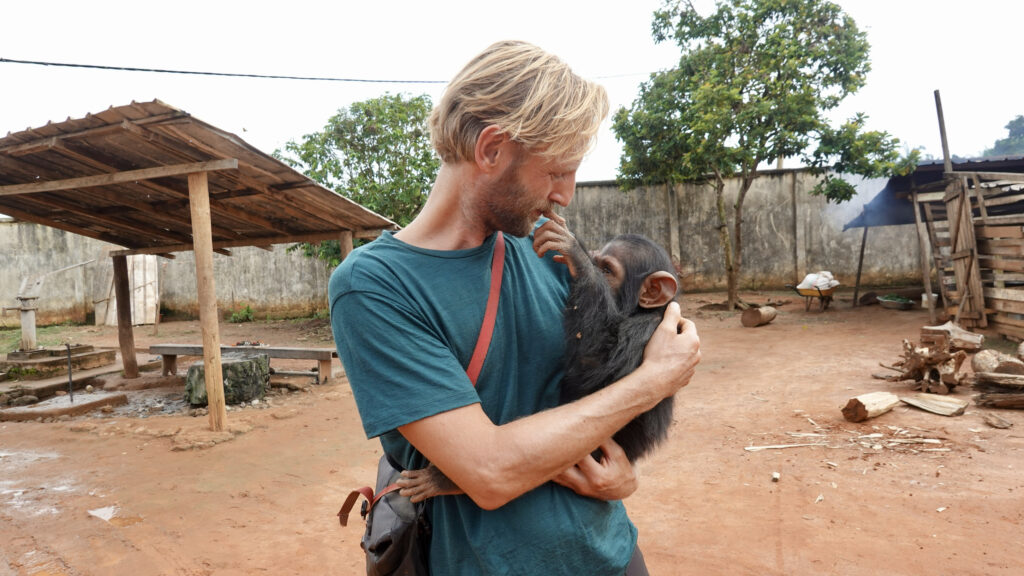
The day continues on to another small Baka village. We are sitting on the back of Dieudonné's motorcycle. He waves and greets many as we continue out of town on the characteristic red roads. In the Baka village we visit a house that Rita Rossi built and which a family has now taken over. There is a dilapidated bed, but the house is otherwise empty. The family lives in a cabin, which they have built a little from there. We also visit the school that Rita has built. Right now it is empty as it is the summer holidays. One of the women from the school is there. She has taken over teaching at the school. She is two years away from completing her education, but became pregnant and had to go back to the village to look after her child. When the child is older, she hopes to continue at school again.
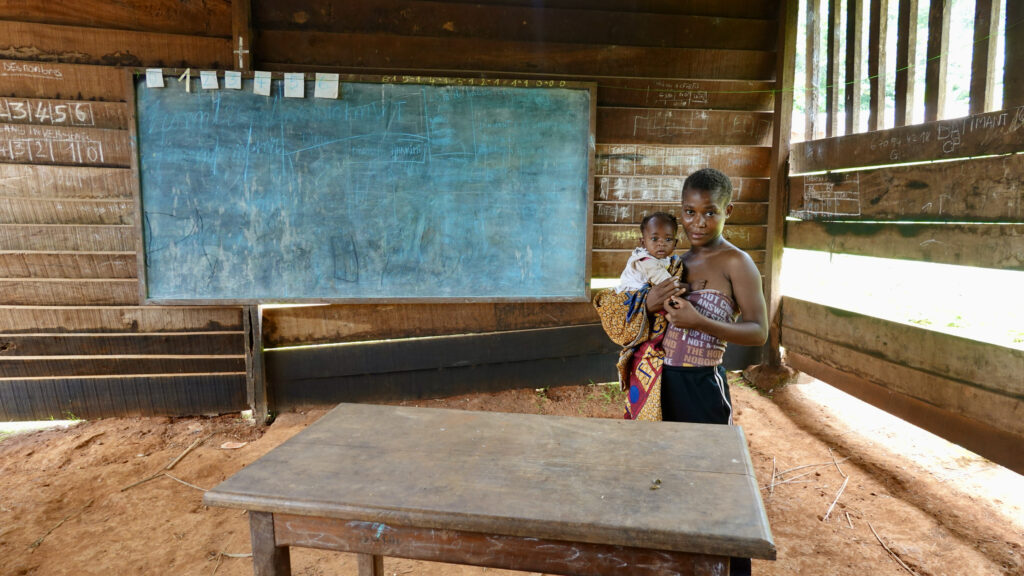
We drive a little further to visit another family who has lost their 13-year-old daughter. The house is completely empty, and the neighbors say that they are taken in the woods. Our big dream is to walk in the forest with the Baka, learn about the plants and animals, seen through their eyes and their vast knowledge. But it can't really be done. However, we find warmth in the fact that amidst the misery of the Baka, it is clear that they still go out into the forest often, not just to hunt, but to be.
From tropical wood to designer chair
The situation of the Baka is complex and influenced by many elements, but one thing is certain. Their forest and home are getting smaller day by day. Every day we see trucks with huge logs driving out of the rainforest and towards the port of Douala to be exported to the West and Asia. We would like to find out more about that. We have read and heard a lot about deforestation and the consequences it has for the climate, animals and population, but standing in the middle of it and seeing the deforestation makes an impression.
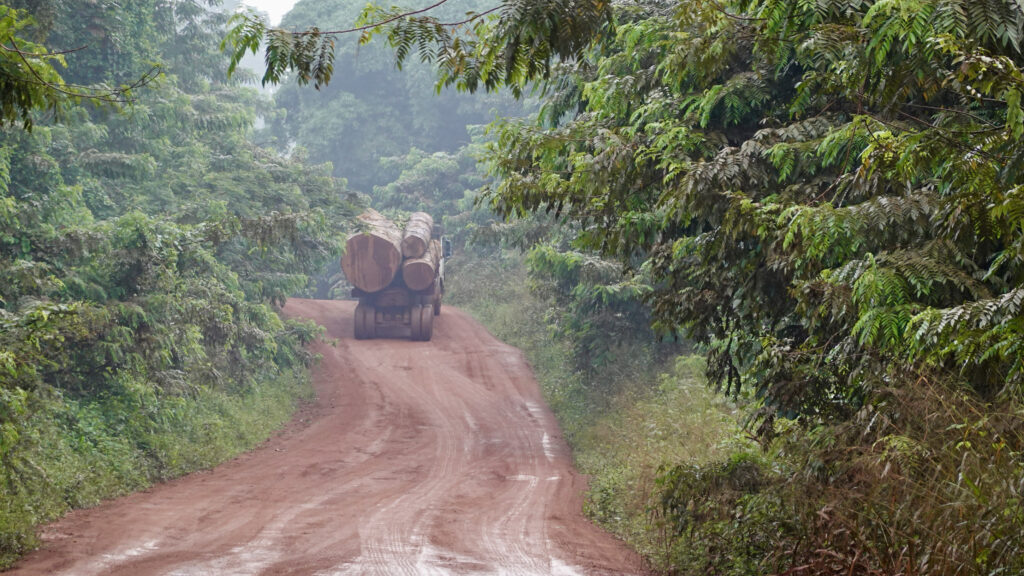
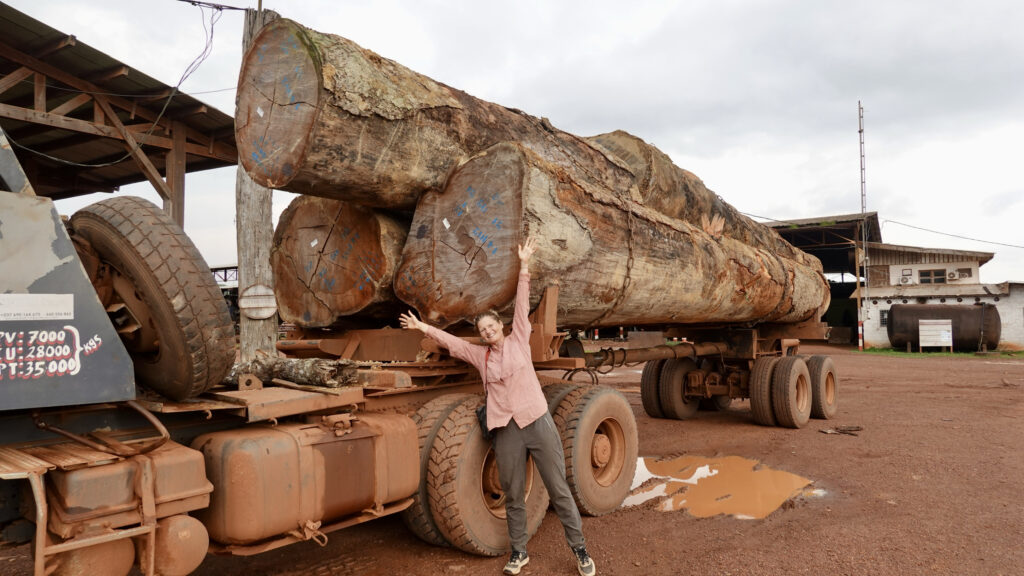
We drive with Dieudonné to a sawmill deep in the jungle. In the huge area, several trucks with large logs are loaded onto the trailer. With Dieudonné's good persuasion skills and a call to the boss, we are allowed a tour of the place. We learn how there are three types of trees that they go after. The precious wood in particular is in high demand. The dark hardwood used for everything from furniture, boats, musical instruments and much more. This is what lies in front of us on a truck, and which the man says may be a 150-year-old tree. We walk around the factory and see the various steps from when it is on the truck until it is split and packed onto pallets. There is a large batch of wood ready to be shipped to Canada. He says that they work with the certification, OLB, which ensures that it is not illegal wood, but they do not work with FSC, which ensures that it is sustainable wood. He also says that there will be a new certification from the EU in December, which will affect them.
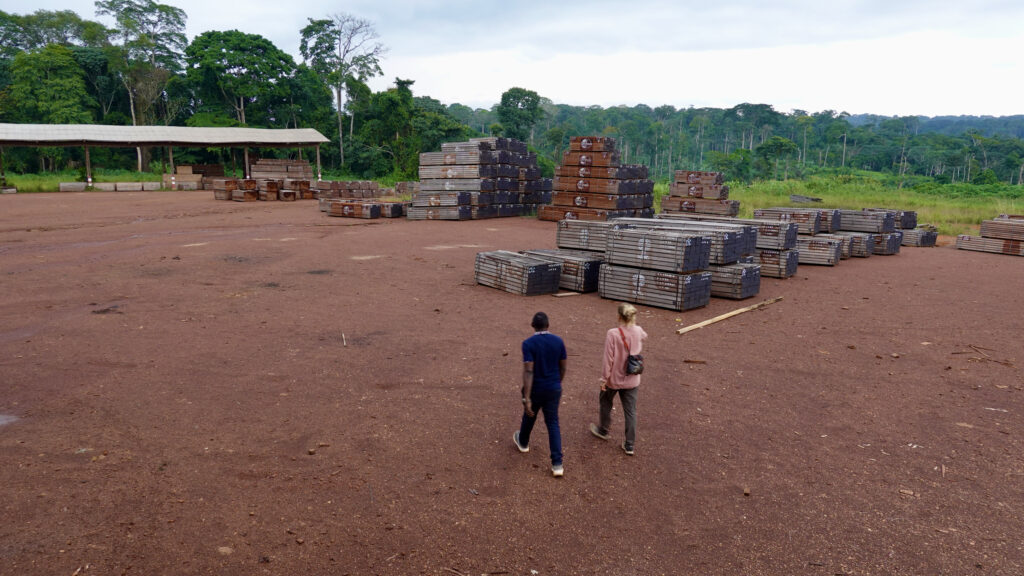
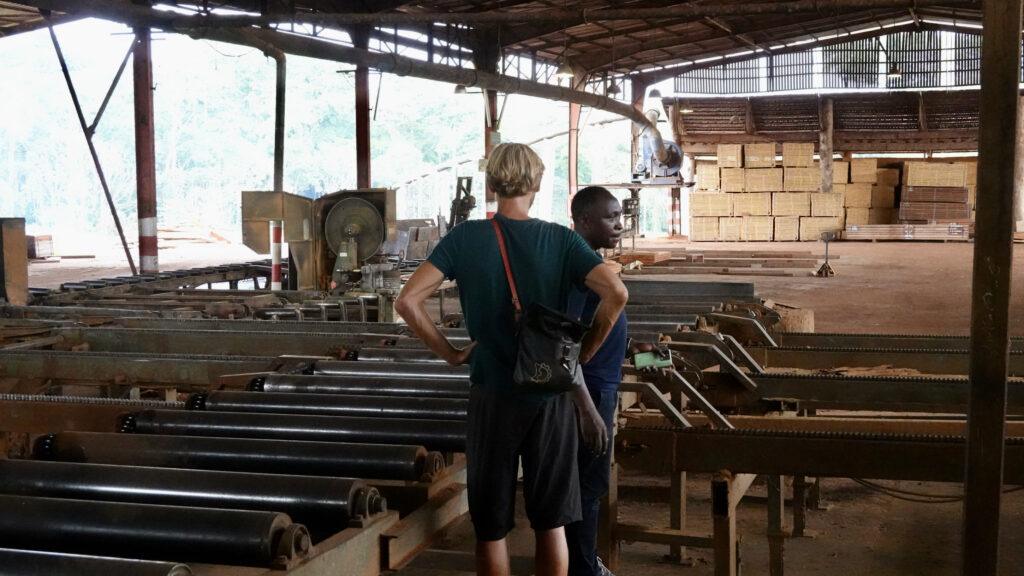
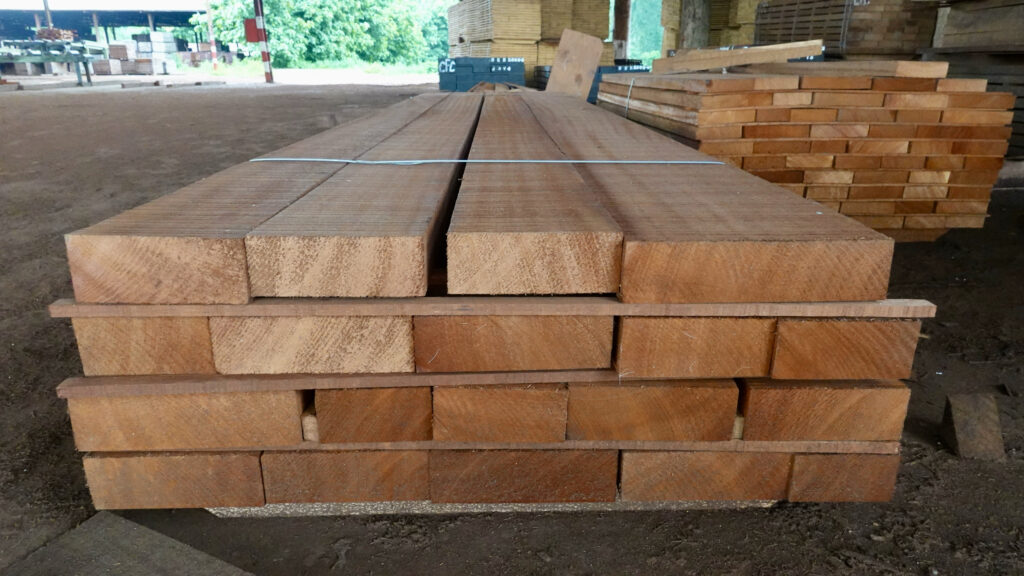
Right now they are working in a cycle where they can come back to the same area after 30 years to cut down trees again, and that the trees must be of a certain size in order for them to cut them down. Although he also adds that it might be a little smaller when they get back. They don't do anything to replant, as the forest itself manages it in his opinion. We continue on behind the large factory. Here there is a whole village of 300 people who work for the company in different ways. Either at the factory, in the forest or with service around the factory. The man tells us how the factory is obliged to comply with all sorts of different rules. Most from the EU. Among other things. must they ensure that the 300 employees do not hunt illegally in the forest. They do, among other things, know that you can indicate if you see someone hunting.
We are invited to dinner in the small working-class town. The dish is bushmeat! Nobody raises an eye. Wondering how to comply with all the other rules?!
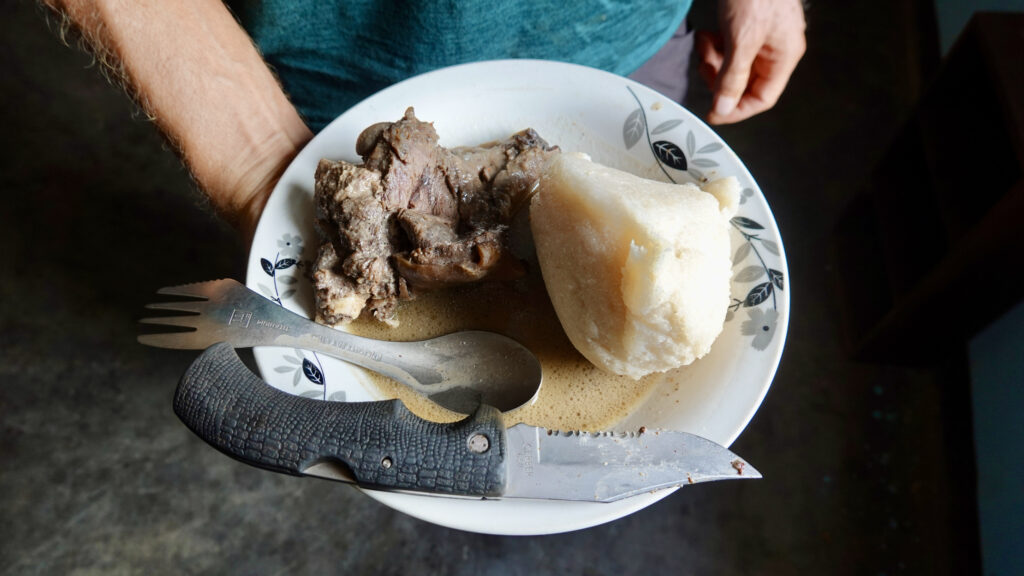
Just as green the forest is on the map, just as black it looks for its future. In addition to deforestation, there is also mining, which is a whole chapter in itself. Like so much else we have experienced so far on our journey in Africa, it is easy to criticize the deforestation and mining, but there is so much behind it. So many people who are trying to survive and get an everyday life together. Corruption, power and history. A huge pressure and power struggle for the resources from other parts of the world. Nothing is black and white, but full of nuances - but there is no doubt that what is happening is harmful to the entire population of the earth, and that it is the people of the forest; The Baka – who pay the highest price.
What is the future of the Baka people?
As we leave Cameroon our brains are bursting with impressions. Of all the contradictions that we have encountered in the rainforest. How one of the world's last indigenous people living in harmony with nature is pushed to the side of the road while they see life and their living conditions pass them by on the back of the big trucks. How they are forced into a society that is unnatural to them and without help to integrate into it. How the tranquility of nature and their sharp senses are replaced by alcohol and internal conflicts. How an entire population group loses so that Cameroon's elite can become even richer and the rest of the world can get nice houses, furniture, boats and whatever else the exported wood is used for. How the forest and its animals disappear and how it affects the entire world's climate.
Fortunately, we meet people who want the Baka people well and each one does what they can to help them. About warm-hearted people who fight for the rights of others. And who let us become part of their everyday life for a while.
We have learned many things in Africa and one of them is that everything has a price. How Africa is blessed with many of the world's most important raw materials, but that it is precisely also their curse, because it means a struggle for resources, and the Baka are the losers in that struggle.
A huge thank you to Peder Frederik Jensen for putting us in contact with Charles Jones. Together with photographer Anders Rye Skjoldjensen, Peder has published the book 'Under the same moon' about climate change in Africa. An exciting book that gets close to the people who feel climate change every day in their daily lives.
